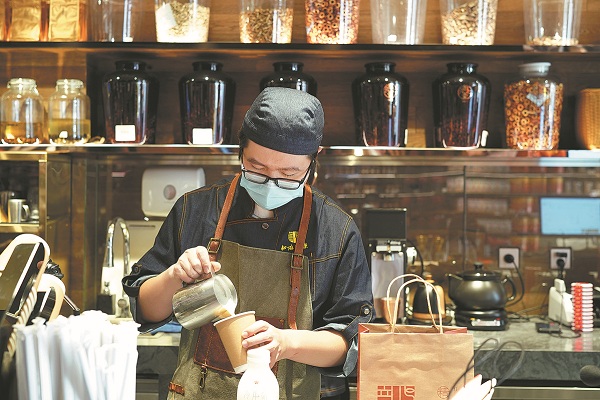New brew to ride health trend

A barista makes coffee containing traditional Chinese medicinal ingredients at a shop in Beijing in November 2020. [Photo/CHINA DAILY]
Lu Jiming, a coffee shop owner in Nanning, capital of Guangxi Zhuang autonomous region, is quietly brewing a "business" combining traditional Chinese medicine and coffee, driven by the younger generation's new consumption frenzy that is heavily tilted toward healthy lifestyles.
Inside an old alley on Gucheng Road, Lu's coffee shop, which resembles a TCM pharmacy, is open only till 6 pm each day. Named Herbal Coffee, the shop is a magnet for young consumers streaming in on a hot summer's day to have a swig of its famous TCM-flavored brew.
"I have been planning on coming to the coffee shop for a long time. My friend and I drove 40 minutes, and stood in line for 20 minutes more, to get a rhodiola latte and a mogroside Americano. The coffee with a special fragrance and fine mellow aftertaste, and the novel experience of sitting inside a 'TCM pharmacy' drinking it, were well worth the wait," said a young woman surnamed Zhang.
Soon, Zhang was sipping the drink, taking selfies with friends, and waiting to post her unique experience on social media.
Zhang is among a rising number of millennials who are paying greater attention to maintaining good health. As many like her are loyal coffee fans, the combination of TCM and coffee is gaining in popularity.
"In the post-pandemic era, healthcare awareness of consumers has been rising. They are looking for beverages that both taste good and are also beneficial to the body," said Chen Di'ao, store manager of Banzhanzhuyu, a teahouse in Nanning. "Therefore, we introduced health-preserving tea. The top two sellers are digestion-boosting hawthorn drink and body-warming Chinese angelica tea."
Chen Sheng, head of the China Real Estate Data Academy, said that a consumption upgrade has meant that consumer demand for beverages is turning "more diversified and personalized, incurring the fashion of health-preserving beverages".
"In addition, the unique consumption experience attracts consumers, especially the young, to pay a visit to a coffee shop, buy a cup of coffee, and take photos to share with friends on social media, satisfying their social needs," said Zhang Shule, a columnist at people.cn.
Lu, the owner, barista and the sole server of Herbal Coffee, said the shop once sold over 100 cups of coffee in a single day, a record. He said consumers have often complained on social media that the shop lacks adequate staff to cater to its steady stream of visitors.
A recent survey jointly conducted by China Media Group, the National Bureau of Statistics, and China Post showed that health-preserving consumption ranked third in young people's expenditures, next only to spending on tourism and digital products.
Sensing the business opportunity, pharmaceutical companies are also joining the bandwagon.
Pharmacy giant Beijing TRT Group has launched a sub-brand Zhimajiankang, and opened several outlets in Beijing, offering health-preserving drinks and healthy snacks. The prices of the beverages range from 32 yuan ($4.4) to 88 yuan.
"Some customers are not used to the taste of drinks mixed with TCM.We are actively exploring more widely acceptable flavors to satisfy their demand," said the head of a Zhimajiankang outlet in Beijing.
In August, Tong Ren Tang Technologies Co Ltd, a subsidiary under TRT Group, joined efforts with Xiami Music and launched a music festival themed by Shengmaiyin, a TCM drink, aiming at catching the attention of young consumers.
Lu from Herbal Coffee said his store, which opened officially in February, received two offers for business cooperation rather quickly.
"The current coffee track in China is fully competitive. Without careful and differentiated business strategies, a coffee shop will be driven out of the market sooner or later," he said, being asked how the health-preserving coffee sector can be turned into a viable, long-term business. "The product itself matters, but user experience is even more important."
To offer a better environment for consumers, Lu is planning to open another branch soon. He has also recruited staff members to help, considering building Herbal Coffee into a social community and introducing new business lines.
"Health-preserving consumption is expected to be a future trend, which will not only penetrate into beverages, but also a lot of other sectors such as catering and fitness," said Lu Buyun, an expert in business strategy and founder of a female consumption brand. "Brands should make a careful business plan and stay tuned to consumer needs to adjust their products and services on time and realize sustainable development."














